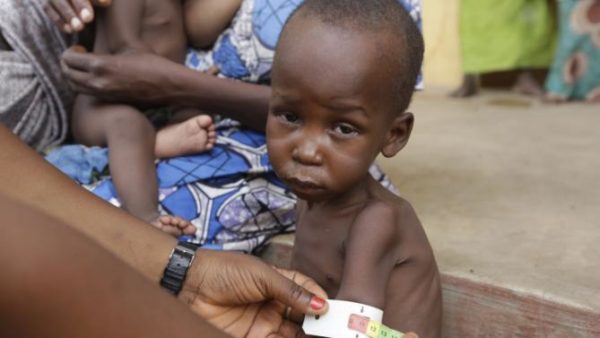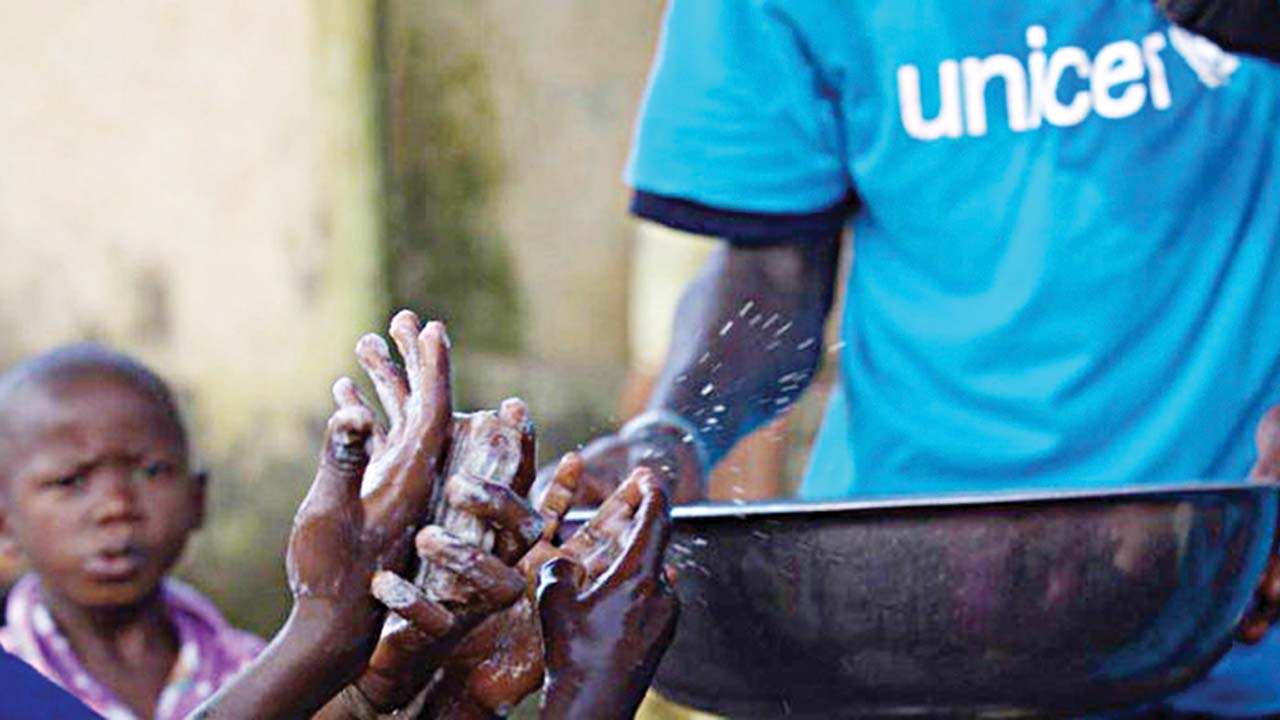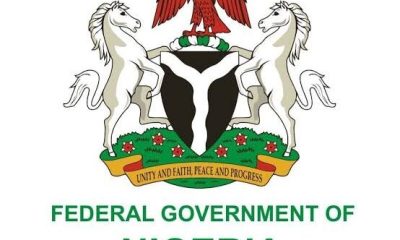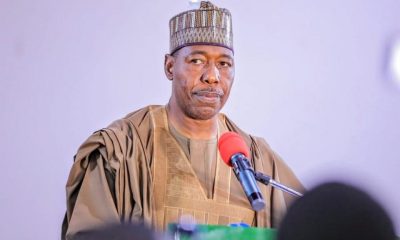News
Bichi: Appreciating An Uncommon Representative

By Bala Adamu
In a nation where ethnic and tribal champions often take centre stage, Hon. Abubakar Kabir Bichi stands out as a shining example of a true patriot. As the member representing Bichi federal constituency of Kano State, he has consistently demonstrated a commitment to the national interest, subsuming ethnic cleavages for the greater good. He is broad-minded, accommodating, receptive, sensitive, and at home with everyone, not minding your political affinity.
Hon. Bichi’s heart of benevolence towards his immediate and remote constituents is unparalleled, not just in the history of Kano State but also in Nigeria at large. Unlike other political actors whose acts of humanitarianism are tied to political payoffs that they are pursuing, lending strategic support to the people of his native Bichi federal constituency and Kano state, in general, is just naturally a part of Hon. Abubakar Kabir Bichi’s life.
From the jobless, he has empowered, to the underprivileged, he regularly wipes off their tears, the indigents he has given boundless hope, and the communities in Kano State he has saved from the impending crises of water-borne diseases. Hon. Abubakar Kabir Bichi is, no doubt, not in politics for himself but for the people.
As the Chairman, the Committee on Appropriation in the House of Representatives, Hon. Abubakar Kabir Bichi has demonstrably shown that he is a leader who had long chosen to be different from others. His humble and spartan beginning must have built-in him the virtue of empathy while growing up. It must have also inculcated in him a surfeit of other values, some of which are humility, compassion, generosity, hard work, and the fear of God.
Sincerely, Hon. Abubakar Kabir Bichi is an embodiment of the aforementioned sterling values. And these values are at the core of our value system, which he is part of. It is difficult to find people who are strong adherents to the value system to stray into mindless absurdity in their public conduct, except in minor cases of fallibility that are common to all humans.
So, reflecting on what I call ‘political net worth,’ one cannot fail to appreciate Hon. Abubakar Kabir Bichi’s bridge-building skill and sagacity in the national assembly. Hon. Bichi is one politician who receives a deafening ovation of almost equal measure in any part of Kano state and across Nigeria he visits. He is loved, cherished, and celebrated lavishly anywhere he finds himself.
This bridge-building skill is eloquent in the synergy that underlines the robust and cordial relationship between him and his colleagues in the national assembly, where he serves as the Appropriation Committee Chairman of the Green Chamber. The good relationship has led to increased collaboration, leading to expeditious execution of Parliamentary businesses.
Hon. Abubakar Kabir Bichi has never disappointed his constituents, and in his representative capacity, he brought patriotic zeal and dedication to bear on representative democracy. Unknown to many, the Appropriation Committee of the National Assembly is the major driver of legislative activities, the committee steers the intricate workings of the legislature.
The Appropriation Committee is the unseen engine that powers the vast legislative machinery, ensuring every cog and wheel turn smoothly to drive progress and stability in the legislature. Therefore, we must shift our focus from merely chronicling the political and legislative trajectory of Hon. Abubakar Kabir Bichi to extracting the invaluable lessons situated within his leadership style.
Hon. Abubakar Bichi’s representative status in the National Assembly is not just one of personal success but a profound testament to the transformative power of humanity and the enduring impact of selflessness. At its core, his vision and political leadership style underscore the stark contrast between uncommon altruism and prevalent self-interest.
In a world often overshadowed by self-interest and personal aggrandizement, Hon. Abubakar Kabir Bichi’s style of representation and political leadership inspires hope, reminding us of the overwhelming fulfillment of serving others and prioritizing the collective good over individual gain.
His self-worth is antithetical to core Islamic convictions, as he does not trust or boast of his successes and life achievements, which underscores the fact that actual value and security do not lie in wealth or possession. Accordingly, despite his immense success and influence, Hon. Abubakar Kabir Bichi remains grounded in humility, eschewing the trappings of ego and entitlement that often accompany positions of influence.
No, I will continue with the rest of the article.
His humility is not a sign of weakness but rather a source of strength that enables him to connect with people from all walks of life, fostering genuine empathy and understanding. In an era marked by divisiveness and polarization, his self-effacement is a powerful antidote, reminding us of the common humanity that unites us and the importance of approaching life with humility, grace, and compassion.
Hon. Abubakar Kabir Bichi embodies the noble virtue of the Greek gods “Sophrosyne and Prometheus”, authenticating the power of humanity and philanthropy. Like Sophrosyne, the personification of temperance and moderation, Hon. Bichi epitomizes a balanced and restrained approach to life, demonstrating remarkable willpower and moderation in all endeavours. His modesty is seen through his actions as he quietly works to uplift others and positively impact society.
And like “Prometheus” who took fire from the gods to benefit mortals, Hon. Abubakar Kabir Bichi is known for his selfless devotion to charitable causes within his immediate constituency and beyond. His dedication to humanitarian endeavours and commitment to serving others reflected the essence of true philanthropy. His act of kindness and generosity towards people mirrors the benevolence spirit of “Prometheus”, serving as a witness to the power of benevolence.
Therefore, Hon. Abubakar Kabir Bichi’s style of political leadership should be seen as a powerful reminder of the enduring value of humanity and philanthropy in a world often consumed by self-interest and personal aggrandizement. In his extraordinary political voyage and service to humanity, Hon. Abubakar Kabir Bichi embodies the triumph of determination and persistence in service.
His commitment to legislative activities around the clock is unarguably a testament to his character and sound background, which has immensely impacted on his constituents, making them feel the depth of his dedication. No wonder, beyond his immediate constituency, and across Kano State, he is known and called “representative of the masses”.
Strictly speaking, his unique style of representation in the Green Chamber is indeed a game-changer, particularly for his immediate constituency and beyond. At the center of his political ideology lies an unwavering commitment to amplifying the voice of the people he represents. His steadfast dedication to genuine representation serves as an inspiration to all those who aspire to leadership roles.
Hon. Abubakar Kabir Bichi’s presence on the political stage serves as a symbol of hope for those seeking responsive and accountable governance. His journey so far in politics can unmistakably be likened to an experienced dancer, mastering the intricate steps and gracefully navigating the complexities of politics.
His ability to adapt to the ever-evolving circumstances and shape the course of political discourse and other national issues is a testament to his resilience and visionary outlook. There is no gainsaying in affirming the fact that Hon. Abubakar Kabir Bichi’s political endeavour will yield greater success and usher in a positive transformation in the nearest future.
Interestingly too, Hon. Abubakar Kabir Bichi has always recognized the youthful population as he had overtime shown interest in the values associated with mentorship. He had several occasions assisted youths in his constituency who opted for mentorship orientation towards realizing their full potential. He actively engages youth groups and initiatives focused on providing mentorship and guidance to help these youths navigate the challenges of personal and professional growth.
He has, and still playing a pivotal and crucial role in shaping the 10th National Assembly for the benefit of every Nigerian. The ongoing construction of the Damisa to Muraye road project in Waire Ward and the Kabiru Abubakar Bichi Ultra Modern Market are testaments to his dedication to development. Moreover, his employment of about 100 aides has provided opportunities for youth empowerment, showcasing his recognition of the importance of mentorship and guidance.
Adamu is a public affairs analyst and contributed this piece from Kano.
News
BOWFT: Edo First Lady, Obaseki, Rallies Wives of Governors to Address Teenage Pregnancy and Abortion

The Edo State First Lady, Dr. (Mrs.) Betsy Obaseki, alongside her Oyo State counterpart, Mrs. Tamunominini Makinde, has called for concerted efforts to combat the rising prevalence of teenage pregnancy and abortion, which significantly hinder the social development of young girls in Nigeria.
This call to action was made during a seminar in Benin City, marking the fourth edition of the Betsy Obaseki Women Football Tournament (BOWFT), themed “Say No to Teenage Pregnancy and Abandonment.” Former First Ladies of Ekiti and Imo States, Erelu Bisi Adeleye-Fayemi and Nneoma Okorocha, respectively, also joined the initiative, advocating for improved conditions for the girl-child.
In her opening remarks, Mrs. Obaseki highlighted the progress made in the fight against social vices impacting young girls, noting a significant increase in the number of states adopting the Violence Against Persons (VAP) Law, which has grown from 12 to 35 states. She emphasized the importance of these laws in protecting the girl-child and holding violators accountable.
“We gather here every year to address social vices affecting the girl-child in the country. We are not just here to play football but to address these challenges,” she stated. “Teenage pregnancy and abortion have become serious issues in Nigeria, particularly in the South-South region, exposing children to various health risks, including Vesicovaginal Fistula (VVF). Poverty has made families vulnerable, leading to the exploitation of young children.”
Mrs. Obaseki also noted the effective measures implemented in Edo State over the past eight years to safeguard the girl-child, including the prosecution of offenders under the VAP Law.
Former First Ladies Adeleye-Fayemi and Okorocha, along with other attendees, expressed gratitude to Mrs. Obaseki for her impactful initiatives that have positively influenced many lives.
The keynote speaker, Ambassador Nkoyo Toyo, praised Mrs. Obaseki’s innovative approach, referring to it as a model for addressing teenage pregnancy and child motherhood in the South-South region. She underscored the importance of empowering girls to assert their rights and make informed decisions about their lives.
“The Obaseki model offers a comprehensive strategy to address the multifaceted challenges facing the girl-child in Nigeria,” Toyo remarked. “It provides a framework for keeping girls engaged and winning the battle against the issues they confront.”
The seminar served as a platform for collaboration and dialogue among stakeholders dedicated to enhancing the welfare and rights of young girls in Nigeria.
News
World Food Day: FAO Reports Over 3 Million Children Under-5 Stunted Due to Undernutrition in Nigeria

On the occasion of World Food Day, the Food and Agricultural Organization (FAO) of the United Nations has highlighted a concerning statistic: approximately three million children under the age of five in Nigeria are suffering from stunting, primarily due to undernutrition. This alarming figure reflects the broader issue of food insecurity affecting millions across the nation.
The FAO has attributed the current food crisis in Nigeria to several factors, including unsustainable agricultural practices, recent flooding, and ongoing insecurity, which have combined to exacerbate the food security situation. Currently, over 4.5 million people are identified as food insecure in Nigeria, prompting urgent calls for intervention to support local farmers and enhance agrifood practices.
This declaration was made by Daouda Doumbia, the Head of the FAO Office in Nigeria’s Northeast Sub Office, during a collaborative event with the Adamawa State government in Yola. Represented by Abdullahi Usman, the FAO Field Office Coordinator for Adamawa, Doumbia underscored the dire need for improved food access and agricultural sustainability in the region.
He stated, “The theme ‘Right to Food for a Better Life and a Better Future’ calls for increased access to food for everyone, emphasizing food as a basic human right.” Doumbia explained that the northeast region faces significant food insecurity challenges exacerbated by climate change, and he urged stakeholders to focus on building a more resilient agrifood ecosystem.
Recent flooding has had a devastating impact on agricultural production, affecting around 104,000 hectares of rainfed cropland and 6,570 hectares of irrigated land. This has resulted in an estimated food loss of 166,731 metric tonnes, potentially depriving approximately 1.6 million people of access to food for six months. The flooding has significantly impacted states like Borno and Adamawa, which are among the worst affected.
Doumbia expressed alarm over the stunting issue, saying, “It is alarming that approximately 3 million children under five in Nigeria are stunted, reflecting the severity of undernutrition.” He further highlighted the problem of malnutrition manifesting in various forms, including micronutrient deficiencies and rising obesity rates among adults, indicating a failure of food systems to provide essential nutrients.
The FAO representative stressed the importance of sustainable agricultural practices, noting that Nigeria is home to numerous local plant and animal species that could enhance nutrition and resilience within its agrifood systems. He warned, “Unsustainable agricultural practices threaten our biodiversity, which is vital for ensuring food security.”
The FAO is committed to supporting affected communities by distributing essential resources. Doumbia revealed plans to support 49,000 households, approximately 343,000 individuals, across the BAY states (Borno, Adamawa, Yobe) with improved seeds, NPK fertilizer, and water pumps during the upcoming 2024-2025 dry season. This initiative aims to restore livelihoods and boost food production in vulnerable communities.
Doumbia emphasized the need for a collaborative approach involving the government, private sector, civil society, and local communities to address food insecurity comprehensively. He noted the critical role of youth in agricultural innovation and sustainable practices, urging their engagement in advocating for healthy diets and resilient agrifood systems.
Moreover, Doumbia highlighted the importance of women in agriculture, stating that they should have a voice in decision-making processes. He remarked on the FAO’s livestock restocking programs targeting women-headed households, aimed at improving food availability in communities.
As the event progressed, Governor Ahmadu Umaru Fintiri of Adamawa State, represented by the state commissioner for Agriculture, David Jatau, called for strategies to enhance crop yields in the face of climate change challenges. Fintiri pointed out that globally, approximately 2.8 billion people struggle to afford a healthy diet, largely due to limited access to modern farming tools among smallholder farmers.
Commissioner Bello Diram, overseeing Reconstruction, Rehabilitation, Reintegration, and Human Services in Adamawa, spoke about the government’s initiatives to support local farmers. He highlighted the provision of access to farming equipment, quality seeds, and fertilizers as essential measures to bolster food production, particularly following the flooding that has affected over 50,000 residents.
The FAO and local officials reiterated the urgent need for effective interventions to tackle food insecurity, which has resulted in significant suffering for millions. As they commemorate World Food Day, the call to action is clear: there is a need for sustained efforts to ensure that every individual has access to sufficient, safe, and nutritious food, thereby fostering a healthier future for Nigeria.
News
Global Handwashing Day: UNICEF and BERWASSA Provide Hygiene Kits to Benue IDP Camp

In observance of the 2024 Global Handwashing Day, the United Nations Children’s Fund (UNICEF) and the Benue State government, through the Benue State Rural Water Supply and Sanitation Agency (BERWASSA), have taken a significant step to support vulnerable communities by donating hygiene kits to 100 households at the Ichwa Internally Displaced Persons (IDP) camp in Makurdi. This initiative underscores the ongoing efforts to improve hygiene practices among the displaced population.
Additionally, the Benue State government announced a release of ₦700 million aimed at enhancing Water Sanitation and Hygiene (WASH) facilities across the state. The Commissioner for Water Resources, Environment, and Climate Change, Mr. Odoh Ugwu, made this announcement during the Global Handwashing Day celebration at the Ichwa IDP Camp.
Mr. Ugwu emphasized that this initiative aligns with the global target of ensuring access to hand hygiene for all by 2030. He highlighted the pressing need for improved hygiene practices in Nigeria, noting that many residents, particularly in Benue State, lack access to soap and running water. Current data reveals that only five percent of households in the state have a designated area for handwashing with soap and running water.
In his speech, Mr. Ugwu urged community stakeholders, including traditional rulers, to enhance efforts in increasing access to safe water and sanitation. This initiative aims to mitigate disease transmission and foster a safer living environment. He expressed gratitude to Governor Alia for his commitment to the WASH sector and recognized UNICEF, BERWASSA, the International Organization for Migration (IOM), and the State Emergency Management Agency for their collaboration in organizing the event.
Mr. Tony Mkpen, General Manager of BERWASSA, explained that the decision to hold the event at the IDP camp was prompted by the poor living conditions and the necessity for residents to adopt better hygiene practices. He pointed out that the day serves as a reminder of the significance of handwashing, especially in environments where sanitary conditions are lacking.
“We celebrated Global Handwashing Day with the IDPs to promote hygienic practices, which are essential in reducing illness,” Mkpen stated. He further remarked on the importance of the campaign, noting that BERWASSA has been actively engaged in promoting water sanitation and hygiene practices in local communities, contributing to the state achieving the status of 11 local governments being Open Defecation Free (ODF).
Mkpen urged the people of Benue to embrace toilet ownership and proper handwashing practices to combat open defecation, which contributes to numerous health issues. “Open defecation contaminates water sources, which leads to health problems. We need to cultivate the habit of using toilets and washing hands afterward,” he stressed.
The Executive Chairman of the State Universal Basic Education (SUBEB), Dr. Grace Adagba, participated in the event by donating cartons of soap to the IDPs. She, along with Scholastica Lan, PRO of the Benue NGO Network (BENGONET), encouraged community members to prioritize handwashing to prevent the spread of communicable diseases.
The camp manager, Jennifer Vangeryina, expressed her gratitude to BERWASSA and UNICEF for their support and for celebrating Global Handwashing Day with the IDPs. The event included a handwashing demonstration by the Commissioner, along with a tap production competition for children from local schools. Participants, including students Azahan Godwin and Jato Cynthia, received prizes such as school bags and water bottles, acknowledging their involvement and reinforcing the importance of hygiene practices.
This initiative highlights the commitment of both UNICEF and the Benue State government to improve the lives of IDPs while fostering a culture of hygiene and health in the region.
-

 Business7 hours ago
Business7 hours agoFuel Price Hike: FG Maintains Routine Engagement with Organised Labour
-

 Politics7 hours ago
Politics7 hours agoPresidency Assures: No Leadership Void as Tinubu, Shettima Remain Engaged Abroad
-

 Politics6 hours ago
Politics6 hours ago“Give Tinubu 40 Years, He Won’t Go Anywhere” – Adebayo
-

 News6 hours ago
News6 hours agoJos DisCo to Launch Feeders Management System and Bilateral Arrangements
-

 News6 hours ago
News6 hours agoBorno: Governor Zulum Praises NCAA DG Najomo for Enhancing Aviation Safety
-

 Sports6 hours ago
Sports6 hours agoEPL: Howard Webb Claims Only Two VAR Errors This Season
-

 Sports6 hours ago
Sports6 hours agoNNL: Gateway United Sacks Head Coach Samson Omiponle
-

 Sports6 hours ago
Sports6 hours agoEPL: Zola Surprised by Manchester United’s Decision to Sell Scott McTominay








